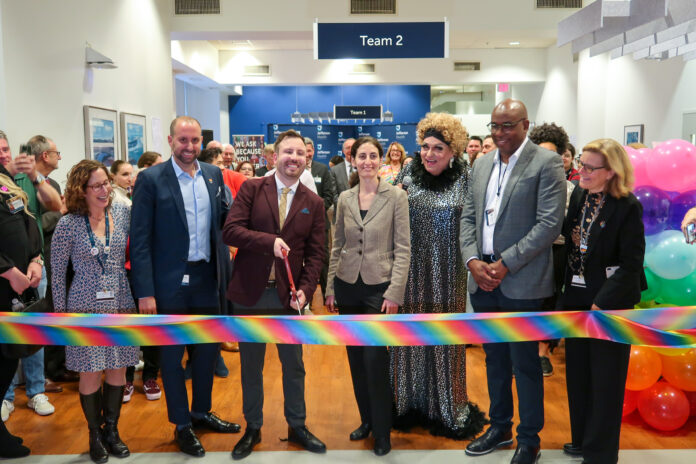
A new clinic that provides affirming primary care for LGBTQ+ older adults just opened up at Jefferson, the first of its kind in the Philadelphia area. The clinic, Pride at the Jefferson Center for Healthy Aging, provides gender affirming care, HIV care and management, sexual health and wellness, advanced care planning and general geriatric medicine.
“You have organizations like SAGE [Services and Advocacy for Gay, Lesbian, Bisexual and Transgender Elders] that have been focusing on that idea of inclusive care,” said Dr. Michael Danielewicz, director of Pride at the Jefferson Center for Healthy Aging. “When it comes to the clinical side and actually operationalizing it, there’s a lot of stuff out there about affirming care, but what about the competent care side?”
All the doctors at the clinic are geriatricians and base their care on the 4Ms model: what matters, medication, mentation and mobility. Mentation has to do with the prevention and treatment of Alzheimer’s and dementia.
“It’s this idea of being an age-friendly health system,” Danielewicz said.
For the past three years, the clinical team at Jefferson’s Center for Healthy Aging has been working on ways to enhance local health care for LGBTQ+ older adults. The Pride clinic developed out of the interests of Danielewicz as well as Drs. John Liantonio and Brooke Salzman, palliative and geriatric medicine specialist and geriatric medicine specialist, respectively.
After completing fellowships in geriatric and palliative care, Danielewicz also spoke to Dr. Anna Flattau, chair of Jefferson’s Department of Family and Community Medicine, about the need for a clinic that serves the 55+ LGBTQ+ population.
On Oct. 11, the team at the Pride clinic held a ribbon-cutting ceremony to mark the official opening of the clinic. Danielewicz and Flattau addressed attendees, as well as Humana Chief Health Equity and Community Impact Officer Dr. Keith Leapheart. Philly drag queen Sandy Beach performed.
Compared to the cishet population, LGBTQ+ older adults are historically disproportionately impacted by smoking and tobacco use as well as HIV, Danielewicz said. They are also twice as likely to be single and live alone, and four times less likely to have children, according to SAGE.
“That has big implications as far as decision-making and serious illness and end-of-life [planning,]” Danielewicz said. “It highlights the importance of advanced care planning, which is competent and inclusive care planning depending on age.”
Danielewicz underscored that the clinic’s leadership team doesn’t only symbolically welcome LGBTQ+ older adults. They also provide continuing education on the subject for providers and staff. They recently conducted a workshop that incorporated anonymous questions and case-based learning on LGBTQ+ issues that some doctors and staff members don’t typically encounter.
“It can’t just be the provider or the physician — it’s the whole experience,” Danielewicz said. “Microaggressions happen and we recognize that. In some cases, a lot of our patients have experienced even worse, like macro aggressions, being denied care or being given inferior care in general over the years.”
Through a partnership between Jefferson Health and the LGBT Elder Initiative at the William Way LGBT Community Center, Danielewicz and his fellow geriatricians and palliative care doctors have been running the program “The Doctor is In.” Through the program, the doctors present information on different topics in geriatric health to groups of LGBTQ+ older adults, including at the John C. Anderson Apartments (JCAA).
John James, long-time LGBTQ+ activist and JCAA resident, already had a new patient appointment at Jefferson’s clinic.
“For me, what was most important was being able to get a new-patient appointment with a [primary care physician] with geriatric experience (and no problem with LGBT of course),” James said.
“[Dr. Danielewicz] seems to be open to working with patients as a team,” he added.
“To have this opportunity for seniors is just extraordinary,” said Ed Miller, program manager of the Elder Initiative at William Way. “There are geriatric doctors in the city of Philadelphia who are practicing, yet the doctors and health care workers that are working today may not have experience with LGBT elders or know about the discrimination and lack of legal or social recognition that they’ve had through their lives.”
Through the Elder Initiative, William Way provides programs for LGBTQ+ seniors, including Tuesday Mornings Out, which is for queer and trans men over 50, and Thrivers, for long-term survivors of HIV.
“Having this practice that we can share with them and have 100% confidence to say that they are going to be welcomed and treated with respect and to be provided with excellent care, is a wonderful resource to have,” Miller said. “Many seniors come into our programs who have lost their partners, or their friends have moved away or passed away. They come in to find connection, to find support. We provide resources as people need them, so adding this to our toolkit is a game-changer for us.”
The clinic’s services are important for the community, but the fact that its care team stands for the visibility and well-being of its patients “is important, especially in 2023 as things are still under threat,” Danielewicz said.
